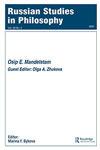宇宙智能的代数:列斐伏尔反身性新控制论中的非人道主义与宇宙论
IF 0.1
4区 哲学
Q4 Arts and Humanities
引用次数: 0
摘要
本文将苏联-美国心理学家列斐伏尔的理论作为新控制论运动的一部分进行重构。特别是,我建议探索他在20世纪70年代至90年代的研究中的一些元素,如系统视野;反射性分析;对整体结构和Janus宇宙论的探索;以及新控制论的实现。对认知和行动的反身结构的兴趣使列斐伏尔认识到世界科学图景的有限性。事实证明,他所研究的相互冲突的对象过于复杂,无法进行行为建模和预测。因此,列斐伏尔扩大了他的智力形式理论的应用范围,依靠功能主义的立场,这使他产生了科幻小说《大修正》(the Big Correction)的叙述。我认为,列斐伏尔的著作不仅提出了20世纪70年代苏联版本的新控制论,而且在非人道主义出现在现代哲学舞台之前很久就发展了自己的非人道主义模型。列斐伏尔的形式理论得到了热力学和俄国宇宙主义元素的强化,将认知行为建立在“大修正”的目的论中,其中包括克服宇宙热寂的想法。宇宙智慧的活动,列斐伏尔将其等同于宇宙中已完成区域的磁等离子体结构,旨在合作并延长生命和智慧的存在。本文章由计算机程序翻译,如有差异,请以英文原文为准。
The Algebra of Cosmic Intelligence: Inhumanism and Cosmology in the Reflexive Neocybernetics of Vladimir Lefebvre
ABSTRACT This article reconstructs the theory of the Soviet-American psychologist Vladimir Lefebvre as part of the neocybernetic movement. In particular, I propose to explore such elements of his research of the 1970s—1990s as systemic vision; reflexive analysis; a search for holistic configuration and Janus cosmology; and the realization of neocybernetics. An interest in the reflexive structures of cognition and action led Lefebvre to an understanding of the limited nature of the world’s scientific picture. The conflicting objects he studied proved too complex for behavioral modeling and forecasting. Lefebvre therefore expanded the boundaries of the application of his formal theory of intelligence, relying on functionalist positions, which led him to the science-fiction narrative of “The Big Correction.” I contend that Lefebvre’s works not only propose an original Soviet version of the neocybernetics the 1970s but develop their own model of inhumanism long before it appeared on the scene of modern philosophy. Lefebvre’s formal theory, reinforced by thermodynamics and elements of Russian cosmism, builds cognitive behavior into the teleology of the Big Correction, which involves the idea of overcoming the heat death of the universe. The activity of cosmic intelligence, which Lefebvre equates with magnetic-plasma structures in the finished areas of the universe, is aimed at cooperation and prolonging the existence of life and the intellect.
求助全文
通过发布文献求助,成功后即可免费获取论文全文。
去求助
来源期刊

RUSSIAN STUDIES IN PHILOSOPHY
PHILOSOPHY-
CiteScore
0.10
自引率
0.00%
发文量
14
期刊介绍:
Russian Studies in Philosophy publishes thematic issues featuring selected scholarly papers from conferences and joint research projects as well as from the leading Russian-language journals in philosophy. Thematic coverage ranges over significant theoretical topics as well as topics in the history of philosophy, both European and Russian, including issues focused on institutions, schools, and figures such as Bakhtin, Fedorov, Leontev, Losev, Rozanov, Solovev, and Zinovev.
 求助内容:
求助内容: 应助结果提醒方式:
应助结果提醒方式:


